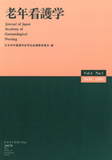Japanese
English
- 販売していません
- Abstract 文献概要
- 参考文献 Reference
本研究は,仮設住宅入居2年後の住民の健康および生活実態を,青壮年期(20〜54歳),向老期(55〜64歳)および老年期(65歳以上)の3つの年齢層別に比較・検討し,特に老年看護の視点から,向老期の住民にどのような看護上の問題があるのかを明らかにすることを目的とした.神戸市中央区の仮設住宅住民のうち調査の同意を得られた301名を対象に実態調査を実施した.その結果,向老期の人々は老年期および青壮年期の人々より,病気がある人(p<0.001),飲酒をする人(p<0.001),喫煙をする人(p<0.001),食事のバランスが悪い人(p<0.05),経済状態が悪い人(p<0.01),暮らし向きの悪い人(p<0.05)の割合が有意に多かった.このことから,向老期の人々は老年期の人々より身体的な健康問題と生活上の問題を多く抱えていることが明らかとなった.以上のことより,大規模災害後の長期的な支援においては,老年期の人々はもちろん,向老期の人々の健康状態にも注意を払っていくことが必要であることが示唆された.
The purpose of this study was to investigate the health and life conditions of temporary house inhabitants who suffered from the great Hanshin-Awaji earthquake. Three hundred and one temporary house inhabitants at chuo-ku in Kobe were obtained through the investigation of the informants. The significant differences among middle-aged (age range : 55-64 years old) inhabitants, aged (age range: 65 years over) ones and young adult (age range : 20-54 years old) ones were showed as follows ; prevalence rate (p<0.001), drinking person rate (p<0.001), smoking person rate (p<0.001), rate of person having bad balance meal (p<0.05), rate of person having bad economic state (p<0.01). The findings of this study suggest that middle-aged inhabitants have more physical, life-style's and economic problems than aged and young adult ones, so we should watch out health and life conditions of middle age as well as the aged after the large-scale disaster.
Copyright © 1999, Japan Academy of Gerontological Nursing All rights reserved.


